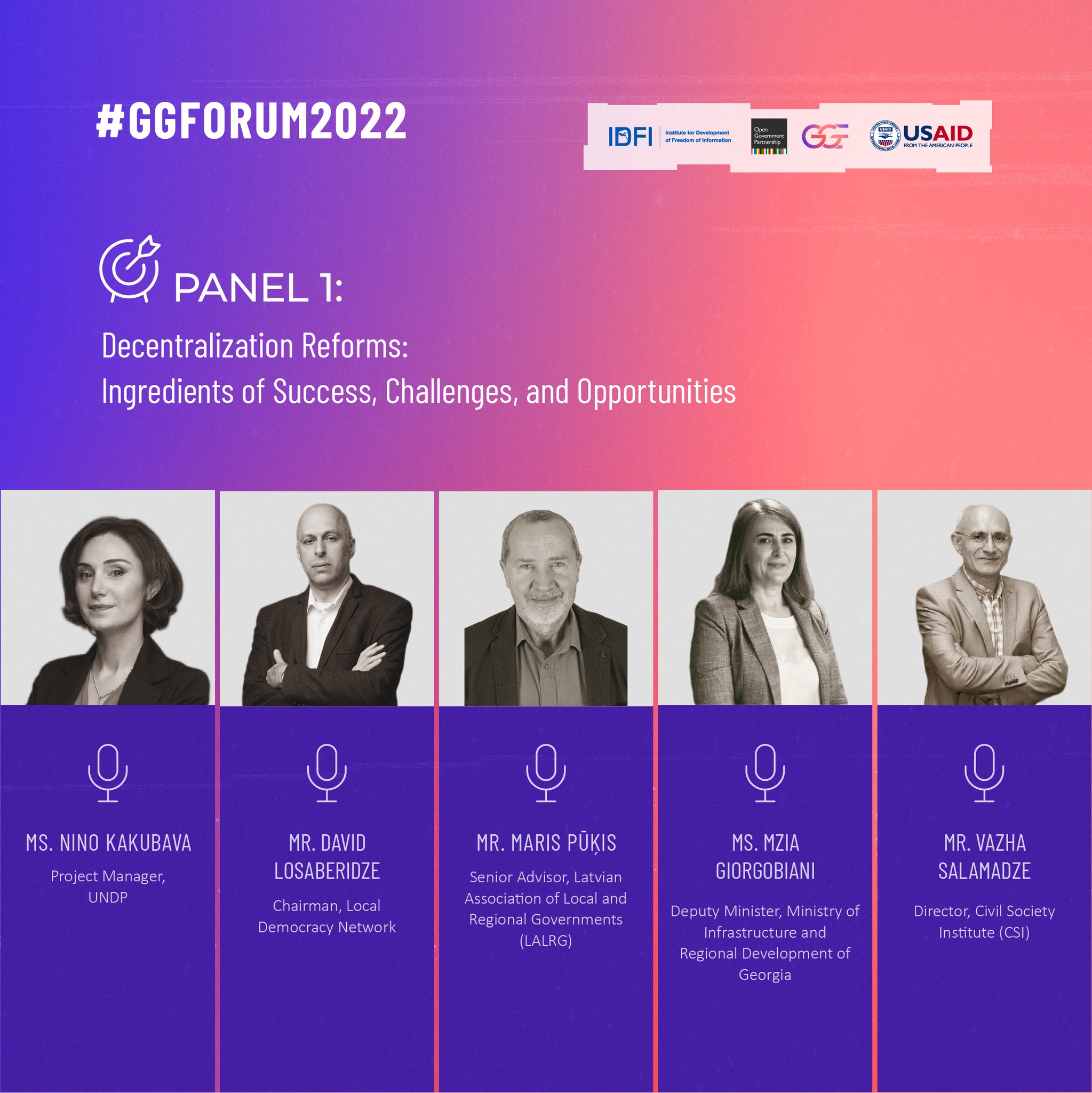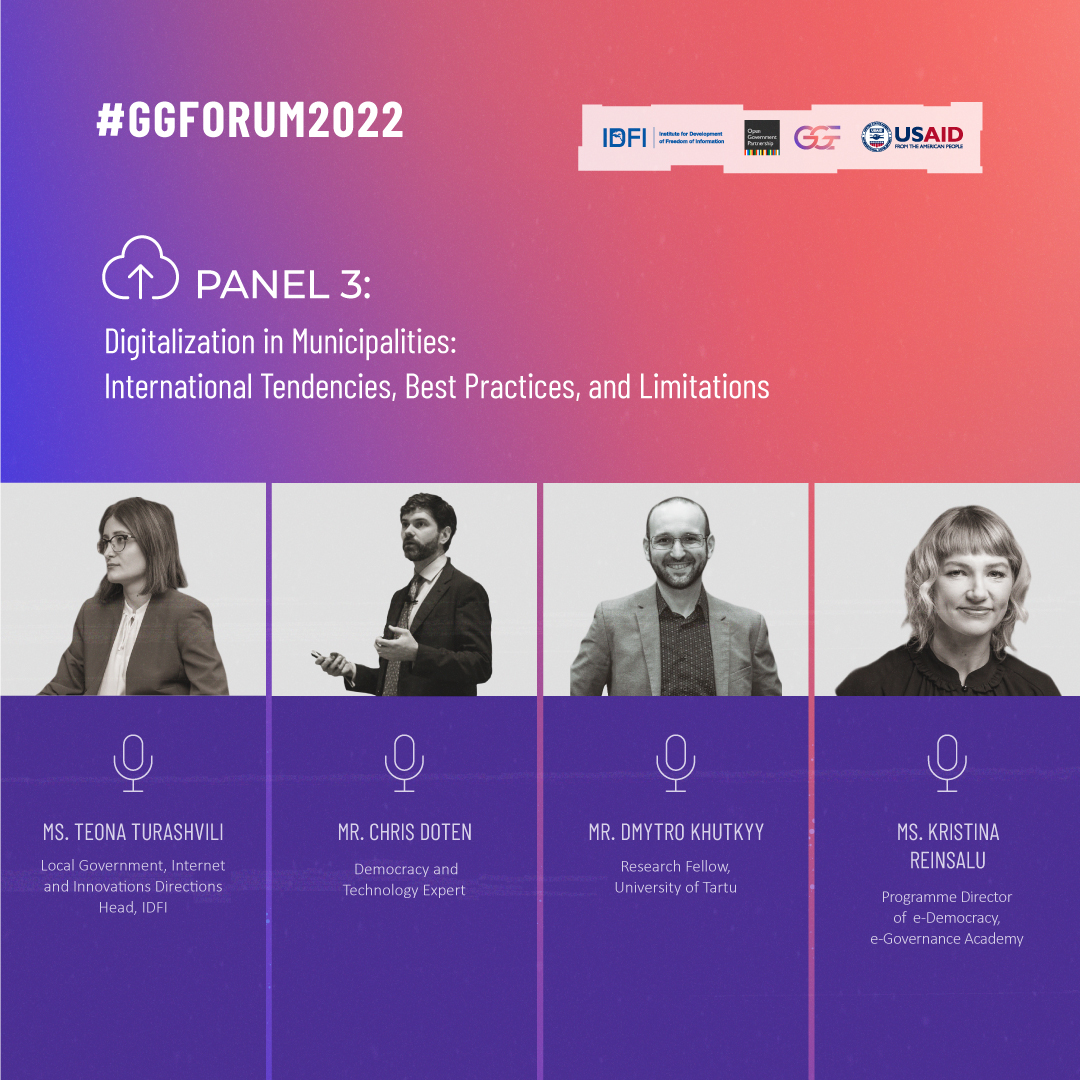


On December 13, 2022, IDFI held an international high-level conference on good governance, titled Accelerating Decentralization: Best Practices and Innovative Solutions. The Forum was organized by the Institute for Development of Freedom of Information (IDFI), in cooperation with the Open Government Partnership (OGP), and supported by a grant from Luminate and USAID Local Governance Program. It was the fourth event in a series of Good Governance Forums (GG Forum), held annually in Georgia since 2019, and gathered international experts, representatives of governments, civil society, the private sector, and international community, with the goal of advancing the good governance reform agenda by raising awareness, exchanging best practices, and fostering debate.
The GG Forum 2022 aimed to contribute on consistent development of local self-governance, to strengthen resilience of Municipalities, to advance decentralization and good governance at the local level, clarifying the importance of digitalization, as well as stimulating the creation of a stable basis for a quality public service delivery at local level, through exchanging best practices and fostering policy debates.
The representatives and experts of prominent international and local organizations working on these topics, as well as public institutions of different countries, including: Ministry of Infrastructure and Regional Development of Georgia, Public Service Development Agency (PSDA), Latvian Association of Local and Regional Governments (LALRG), OECD-SIGMA, OGP Local, e-Governance Academy of Estonia, United Nations Development Programme (UNDP), Access Info, Innovations & Reforms Center (IRC), Local Democracy Network, Civil Society Institute (CSI), The Institute for Change and Innovation and USAID Georgia Local Governance Program delivered speeches during the conference.
A welcome speech was given by Giorgi Kldiashvili, the Executive Director of IDFI, together with Kevin McLaughlin, Chief of Party of the USAID Georgia Local Governance Program. Overall the conference was moderated by Giorgi Kldiashvili.
“Over the last decade, Georgia has made significant progress in terms of local self-governance reform. The country has adopted a comprehensive Decentralization Strategy 2020-2025. The Decentralized System will enable the Government to better respond to population needs at local level, it also will serve as an important benchmark for Georgia’s European and Euro-Atlantic aspirations” - mentioned Giorgi in his opening remarks.
In his opening remarks Kevin McLaughlin, Chief of Party of the USAID Local Governance Program welcomed participants and highlighted the importance of the decentralization reform for effective local self-governance and service delivery at the subnational level.

The first panel covered Decentralization Reforms: Ingredients of Success, Challenges, and Opportunities and was moderated by Nino Kakubava, Project Manager at United Nations Development Programme (UNDP). The panelists included:
- David Losaberidze – Chairman, Local Democracy Network
- Maris Pūķis - Senior Advisor, Latvian Association of Local and Regional Governments (LALRG)
- Mzia Giorgobiani – Deputy Minister, Ministry of Infrastructure and Regional Development of Georgia
- Vazha Salamadze - Director, Civil Society Institute (CSI)
During the panel, the speakers representing both government and civil society emphasized fiscal decentralization and the role of different stakeholders in the process. Deputy Minister of Infrastructure and Regional Development of Georgia, Mzia Giorgobiani, stressed the importance of implementing reforms in the course of the Fiscal Decentralization Reform and some budget allocations planned for the municipalities for 2023. Therefore, the discussion touched upon shortcomings in the decentralization process, and motives preventing active engagement from the society were also debated. Finally, through some of the leading solutions suggested, good practice from Latvia was voiced that could be relevant to Georgia.

The second panel concerned Transparent and Accountable Local Governance: Major Principles, Success Stories and Lessons Learned and was moderated by Mikheil Darchiashvili, Subnational Capacity Expert at the USAID Georgia Local Governance Program. The panelists included:
- Andy Williamson - Senior Researcher, Inter-Parliamentary Union’s Centre for Innovation in Parliament
- Helen Darbishire - Executive Director, Access Info
- Irakli Kotetishvili - Policy Specialist, UNDP Istanbul Regional Hub
- José María Marín - Senior Program Officer, OGP Local
- Tamar Ghlonti - Founder/Director, The Institute for Change and Innovation
The second panel covered aspects of deliberative democracy and different approaches to bringing in new and fresh voices. Panelists explored the main trends in Europe, as well as main challenges. Moreover, the speakers have introduced vital tools for informing society about transparency, accountability, and their role in preventing corruption in municipalities. Lastly, a civil society representative from Ozurgeti municipality shared a tangible experience about the process while institutionalizing instruments needed for civil participation and the role of Open Government Partnership (OGP) in these activities.

The third panel concerned Digitalization in Municipalities: International Tendencies, Best Practices, and Limitations. This session was moderated by IDFI’s Local Government, Internet and Innovations Directions Head, Teona Turashvili. The following speakers participated in the panel discussion:
- Chris Doten - Democracy and Technology Expert
- Dmytro Khutkyy - Research Fellow, University of Tartu
- Kristina Reinsalu - Programme Director of e-Democracy, e-Governance Academy
This panel concentrated on digital solutions for the challenges municipalities are facing in terms of transparency, accountability, and civic participation. Panelists highlighted the importance of understanding the actual needs from the citizen's perspective and the importance of tailor digital projects and needs to citizen concerns and local contexts. All the speakers agreed that technology is the means, not the final end goal and it is the key not to digitize outdated processes. One of the speakers stressed the importance of the genuine will of the politicians and civil servants to implement digital technologies for municipal aims and to optimize the business processes in the cities, towns and villages.

The final panel on the Models of Service Delivery at the Subnational Level was moderated by Nana Tsiklauri, Director of Public Administration Reform and Inclusive Governance at the USAID Georgia Local Governance Program. Another speakers included:
- Giorgi Gabrielashvili – Executive Director, Innovations & Reforms Center (IRC)
- Ketevan Betlemidze – Chair, Public Service Development Agency (PSDA)
- Levan Samadashvili – Public Service Delivery Expert, Georgia
- Nick Thijs - Senior Policy Advisor on Public Administration Reform & Service Delivery with OECD - SIGMA
The last panel was dedicated to current trends and approaches in subnational service delivery models. The speakers emphasized the human-centered approach, which is a focus in every recent public service development debate, which is about being empathetic to a customer and understanding the customer's emotions during the whole journey of service provision. One of the speakers also mentioned a current notion that this human-centered approach may be understanding emotions and being empathetic towards not only customers, but also employees.
Below find the conference details and full program.
Panel discussion recording here avaialble below:
Panel 1: Decentralization Reforms: Ingredients of Success, Challenges, and Opportunities
Panel 2: Transparent and Accountable Local Governance: Major Principles, Success Stories and Lessons Learned
Panel 3: Digitalization in Municipalities: International Tendencies, Best Practices, and Limitations
Panel 4: Models of Service Delivery at the Subnational Level